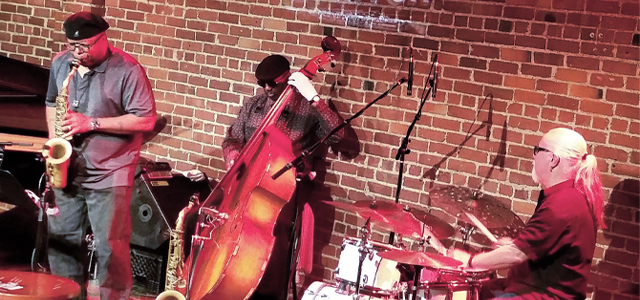San Jose history is a moving fog bank. No matter how dim it gets, holes will open up to reveal bright moments of memory. Now is one of those moments.
After a seven-year run, Cafe Stritch is no more. The Borkenhagens built the club as a temple for their patron saint Rahsaan Roland Kirk (1936-1977), the freewheeling jazz multi-instrumentalist who played three saxophones at once. Anyone who frequented Stritch knew the term “Bright Moments,” the title track of Kirk’s seminal 1973 live album recorded at Keystone Korner in San Francisco. Bright Moments referred to those special convergences of pure bliss, when your favorite meal comes to the table, or your main squeeze rolls in and it’s just the two of you, or any scenario in which light dispels darkness. It’s often used as a greeting—in lieu of hello or goodbye—in various jazz or creative circles.
Cafe Stritch did everything a jazz club is supposed to do, offering Bright Moments that made a single solitary San Jose building feel like an entire city. Punks and professors, lowbrow and highbrow, grizzled veterans and young students of life all made Stritch their second living room. In my case, I don’t have a living room, so Stritch became my only living room. And for me, I couldn’t possibly separate myself from any story whenever I wrote about Stritch because it embodied exactly the historical gonzo-in-retrospect lens through which I already viewed the San Jose landscape.
Upstairs in the mezzanine area overlooking the main floor, for example, I exhibited a show of my travel photography the first year Stritch was open. This was the same area where Metro held editorial meetings every Thursday, circa 2003, while Steve Borkenhagen brought us coffee and scones. Ten years later, there I was, back again, as a photographer.
The next year, I wrote poetry inside Stritch after freeloading Alan Soldofsky’s classes at SJSU. We were studying the jazz poems of Billy Collins and Yusef Komunyakaa, so I paraphrased a few of their lines, infusing them into my own poem as the live music inspired me. A now-defunct journal published the poem and sent me a check for $25.
Those were just two Bright Moments. There were countless others. One night, sax virtuoso James Carter stood outside and regaled us with Sun Ra stories. Listening to Carter spin animated tales was no different than watching him play a raging multiharmonic solo on stage.
Especially churchlike were the Rahsaanathons, the annual three-day runs of Rahsaan’s music, when it always felt like history was unfolding in real time, especially when it took place during the San Jose Jazz Summer Fest. One year I sat outside with Rahsaan’s widow, Dorthaan, surrounded by gobs of people, when up walked legendary Latin jazz trumpeter Jerry González, who told us down-and-out stories about Chet Baker. I felt transported into a jazz history book. You can’t plan this stuff. It just happens. Bright Moments.
Fusion guitar pioneer Larry Coryell even showed up at Stritch one night after gigging across the street at another festival event. Steve Turre pointed him out from the stage. Couple years later, Coryell was gone. Jerry González is also gone.
And then there was Todd Barkan, who ran Keystone Korner in the ’70s. Barkan showed up at Stritch one year and sang the tune “Bright Moments”—an epic spacetime-shattering episode, since he wrote the original lyrics and his club is where Rahsaan recorded the album. In the entire run of Cafe Stritch, that moment was the most cosmic of all.
A week later, speaking over the phone from New York City, Barkan told me his experience at Stritch was wonderfully eerie: “I felt the spirituality and the energy of late ’60s, early ’70s San Francisco Keystone Korner—ionizers on the ceiling taking the pot smoke out of the air kind of vibration,” he said. “Being able to sing the lyrics of ‘Bright Moments’ in that club dedicated to Rahsaan was one of the joys of my life. I’ll never forget it and I’ll always treasure it for the rest of my days.”
I will too. There will never be another Cafe Stritch. Here’s to the fog of memory and Bright Moments for all.



